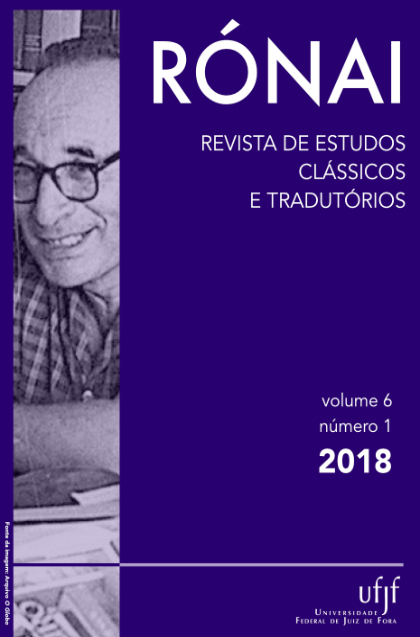The Aegialeus’ tale (The Ephesian tales, Vol. 1): a translation and comment
DOI:
https://doi.org/10.34019/2318-3446.2018.v6.23248Keywords:
Xenophon of Ephesus, ephesiacs, Anthia and Habrocomes, ancient Greek romanceAbstract
“A história de Egialeu” é uma narrativa intercalada em Efesíacas ou Ântia e Habrocomes, romance de Xenofonte de Éfeso (II. d.C.). Considerado como um autor de poucos méritos literários, Xenofonte se destaca pela habilidade com que compõe essas narrativas secundárias em sua obra, que, paradigmáticas, se oferecem como exemplo para os protagonistas. O objetivo desse artigo é apresentar a tradução dessa passagem (Efesíacas, V.1), antecedida por uma breve exposição sobre autor e obra e sua discussão.
Downloads
References
Brandão, J. L. A invenção do romance. Brasília: Editora da UNB, 2005.
Duarte, A. S. Dez textos para conhecer o Romance Antigo. In: Faria, J. R. (ed.) Guia bibliográfico da FFLCH. São Paulo: 2016. Publicação online acessível em http://fflch.usp.br/guiabibliografico
_____. A história de Hipótoo (Efesíacas, III.2): tradução e comentário. In Translatio, 14/1, 218-226, 2017.
Eurípides. Alceste, Heraclidas, Hipólito. Tradução de Clara L. Crepaldi. São Paulo: Martin Claret, 2018.
Gärtner, H. Xenophon von Ephesus. in Pauly, A. et al. Realencyclopädie der classichen Altertumwissenschaft, IX A 2: 2055-89, 1983.
Hägg, T. Die Ephesiaka des Xenophon Ephesios - Original oder Epitome? in Classica et Mediaevalia, 27, pp. 118-61, 1966.
Kytzler, B. Xenophon of Ephesus. In Schmeling, G. (ed.) The novel in the ancient world. Boston: Brill Academic Publishers, 2003, pp. 336-360.
Morgan, J. R. Xenophon of Ephesus. in De Jong, I.; Nunlist, R. Bowie, A. (ed.). Narrators, narratees, and narratives in ancient Greek literature. Leiden: Brill, 2004, pp. 489-92.
O'Sullivan, J. N. Xenophon, The Ephesian tales. in Cueva, P.; Byrne, S. (ed) A Companion to the Ancient Novel. Oxford: Wiley Blackwell, 2014, p. 43-61.
_______. Xenophon of Ephesus: his compositional technique and the birth of novel. Berlin: Walter de Gruyter, 1995.
Ruiz-Montero, C. Xenophon of Ephesus and Orality in the Roman Empire, Ancient Narrative, v. 3, 43-62, 2004.
Whitmarsh, T. Narrative and identity in the ancient Greek novel. Cambridge: Cambridge University Press, 2011.
Xenophon Ephesius. De Antia et Habrocome Ephesiacorum Libri V. Ed. J.N. O'Sullivan (Bibliotheca Teubneriana). Monachii et Lipsiae: K. G. Saur, 2005.
Xenophon of Ephesus. Antia and Habrocomes. in Longus; Xenophon of Ephesus. Daphnis and Chloe; Antia and Habrocomes. Edited and translated by J. Henderson. Cambridge-Mass: Cambridge University Press, 2009.
Downloads
Published
How to Cite
Issue
Section
License
Copyright (c) 2018 Adriane da Silva Duarte

This work is licensed under a Creative Commons Attribution 4.0 International License.
Copyright
The authors of the published contributions agree with the following items:
1. The authors keep the copyright and convey to the journal the right of first publication, the work being licensed under a Creative Commons Attribution License 4.0 International.
2. The authors are allowed and stimulated to publicize and distribute their work online after the publication in the journal, recognizing first publication in this journal.
3. The authors of the approved works authorize the journal to distribute their content, after publication, for reproduction in content indexes, virtual libraries and similars.
For more information about Creative Commons Attribution License 4.0 International, please, go to: https://creativecommons.org/licenses/by/4.0/deed.en
Editorial exemption
The authors of the published contributions are entirely and exclusively responsible for their contents. Its content does not represent an official position of Rónai - Revista de Estudos Clássicos e Tradutórios neither of Faculdade de Letras da Universidade Federal de Juiz de Fora or their partner institutions.



